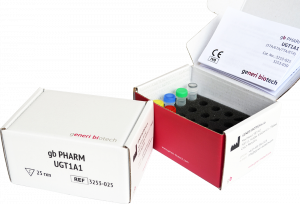gb PHARM UGT1A1
Detection method:
melting analysis
This in vitro diagnostic kit enables DNA genotyping in terms of the presence of 5TA (UGT1A1*36), 6TA (UGT1A1*1), 7TA (UGT1A1*28) and 8TA (UGT1A1*37) polymorphisms in the UGT1A1 gen. The detection is based on the Q-FRET probe and uses the analysis of melting curves for genotyping.
Clinical implications of the CE IVD kit
The enzyme UDP-glucuronosyltransferase (UGT) is responsible for the conjugation phase of bilirubin biotransformation. The activity of the enzyme is conditioned by the presence of polymorphisms in the UGT1A1 gene. A wild-type variation of the gene, an UGT1A1*1 allele, carries 6 TA-repetitions. Homozygous UGT1A1*28 variant is, in Caucasian and Afro-American populations, the most frequent cause of Gilbert syndrome, a benign disorder associated with a mild chronic hyperbilirubinemia. In that case, the glucuronidation activity of UGT1A1 enzyme is reduced to 20–30%.
Alleles UGT1A1*36 and UGT1A1*37 are mainly presented in Africans ethnic group. Genetic variations within the UGT1A1 gene have also been associated with the development of certain drug toxicities. The UGT1A1*28 allele is associated with neutropenia and diarrhea in patients receiving the chemotherapeutic drug irinotecan.
The examinations are used to confirm the diagnosis of Gilbert’s syndrome, or before the administration of irinotecan drug and other drugs metabolised by UGT.
Parameters of the real-time PCR diagnostic kit
- sample concentration 5-100 ng/µl
- positive and negative controls included
- melting curve analysis, FAM channel detection

 Kit for isolation of DNA from body fluids
Kit for isolation of DNA from body fluids 

